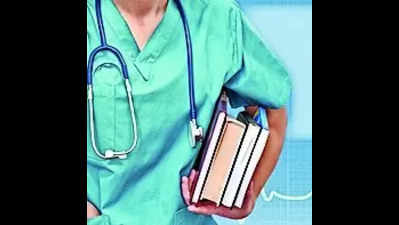- News
- City News
- bengaluru News
- Medicos adopt families, learn community medicine hands-on
Trending
Medicos adopt families, learn community medicine hands-on
Through the family adoption program in medical colleges, students like me engage with families, monitor health, and bridge the gap between communities and hospitals. Despite challenges like obtaining Aadhaar numbers, this initiative enhances our understanding of public health and empowers us to make a positive impact on community well-being.

Dhanush’s monthly visits are part of the family adoption programme introduced in the MBBS curriculum. The National Medical Commission had rolled out its new competency-based medical education curriculum for undergraduate programmes in 2021 and made it mandatory in 2023-24. As part of the community medicine curriculum, every MBBS student must adopt five families each, pay them regular visits, monitor their health, ensure they adhere to vaccination schedules, and encourage them to get enrolled with Ayushman Bharat.
It starts from year one and continues for the duration of the MBBS programme. The family to be adopted shouldn’t be in the village where the primary health centre has a tie-up with the college hospital. “Out of five families I work with, three are very friendly. At one place, the interactions are very brief. Another home remains locked most of the time. But it is great exposure for us. Gaining their trust is important. We get a good insight into the living conditions and public health system. We learn early on how to interact with patients and build communication skills,” said Dhanush, a student of Akash Institute of Medical Sciences and Research Centre, Devanahalli.
Bridge to hospital
The students act as a bridge between the family and hospital, and call the latter every time there is an emergency. The programme is still picking up pace in the state. According to Rajiv Gandhi University of Health Sciences, six of over a dozen medical colleges in Bengaluru have started the programme. “There is a lot of paperwork involved in this. The medical education department has to notify the health department. The latter has to identify villages and families and allot them. That is why it is getting delayed. The colleges are being promoted and NMC is regularly following up,” said RGUHS vice-chancellor Dr MK Ramesh.
NMC has now issued an order to colleges to hold medical camps, wherein parameters like demographics, vitals, blood pressure, haemoglobin and urine tests are done.
Officials at Bangalore Medical College and Research Institute said two batches are simultaneously carrying out the programme. “However, it’s too early to say whether it is helping,” said an official.
“With the programme, doctors are accessible to villagers as the students become a contact point. Students, in turn, get exposure. But building trust is crucial. NMC has been asking for Aadhaar numbers of the villagers, and many of them are hesitant to give it,” said Dr Sunil Kumar DR, head of the department of community medicine, Akash Institute.
Oxford Medical College, Hospital and Research Centre has adopted 2,250 families as part of the programme. Dr Jayanthi CR, dean and director, said: “Students get to know about community health issues at the grassroots level. By generating data and relevant statistics, they can take corrective measures to improve the health outcome of the community.”
End of Article
FOLLOW US ON SOCIAL MEDIA










